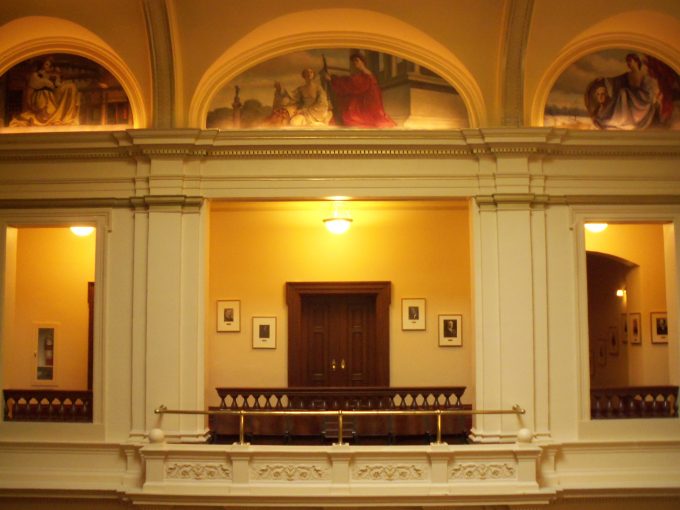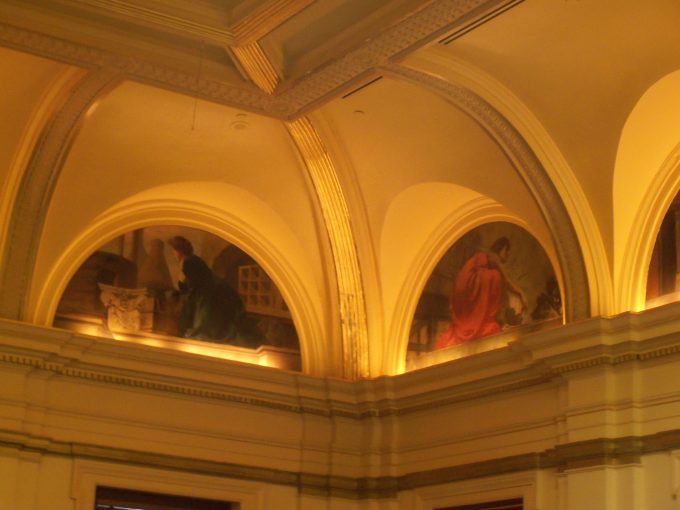
Tuesday, 30 April 2019
…to Jesus the Mediator of the new covenant, and to the blood of sprinkling that speaks better things than that of Abel. Hebrews 12:24
The author has been proclaiming the glory of what God has done in Christ, showing where the faithful have come to, each word building upon the next and contrasting that which was with that which now is. In the third and final verse of this continuing thought, he now says that you have come “to Jesus.”
His is the Name above every name, and that name to which all will someday bow. We have come to the Savior of the world and the bright light shining in the darkness. This great Man is the purpose and point of the faith, and without Him, there is only law leading to death and condemnation. But in Jesus, there is a better hope of glory because He is “the Mediator of the new covenant.”
The Greek reads, “the Mediator of a new covenant.” It is set in contrast to the Old Covenant. What was is exceeded by what is offered. The word “mediator” signified an arbitrator who guarantees the performance of each and every term which is stipulated in the covenant. It is he who works to bring peace between two parties in the fulfillment of the compact.
The word translated as “new” is used only here in this manner of describing this New Covenant. It is the word néos. It signifies something that was not there before. It is something recently discovered. The usual word to describe the New Covenant is kainós, new in quality. The difference is minimal, but it is one more of time rather than quality. However, the word is used elsewhere in the sense of quality as well. In the end, both terms are used to describe this covenant in the Bible, and thus it is a covenant which is both new in time and in quality.
The author then says, “and to the blood of sprinkling.” Here he introduces a new word to describe an Old Testament term into the New. He has already used another word to describe sprinkling, but this particular word is found only here and in 1 Peter 1:2. It is a part of the rites of the sacrificial system where the blood of a sacrificial animal was sprinkled in a certain way and at certain times. That is now applied to the blood of Christ, showing again that what Christ did is in fulfillment of those Old Covenant types and shadows, and it is superior to those.
In this sprinkling, the author says it “speaks better things than that of Abel.” The phrase should be rendered, “speaks better than Abel.” Here, the blood of Abel is personified, just as it was in the Genesis account –
“What have you done? The voice of your brother’s blood cries out to Me from the ground.” Genesis 4:10
Christ’s blood speaks; Abel’s blood cried out. This is not referring to the blood of Abel’s sacrifice being better than the fruit of Cain’s offering. That was already explained in Chapter 11. Their offerings were accepted or not accepted based on the faith of the offering. But in the fallen world, where Abel died and His blood demanded punishment, Christ entered and shed His blood which was sprinkled for us in mercy and forgiveness. This is seen in type in the pattern set by the words of the last martyr of the Old Covenant, and the first recorded under the new –
“Thus Joash the king did not remember the kindness which Jehoiada his father had done to him, but killed his son; and as he died, he said, ‘The Lord look on it, and repay!’” 2 Chronicles 24:22
“Then he knelt down and cried out with a loud voice, ‘Lord, do not charge them with this sin.’ And when he had said this, he fell asleep.” Acts 7:60
The blood of Christ speaks better than the cries of Abel’s blood, and the witness of these faithful was recorded for us for this purpose. The law demands justice; Christ offers forgiveness. The scholar Delitzsch sums up his thoughts on Hebrews 12:22-24 with these words –
“What it was to which Israel in the time of the Old Covenant drew nigh, we have now heard. Their drawing nigh was at the same time a standing afar off; the mount of the revelation might not be approached by them; the voice of God was too terrible to be borne; and yet it was only tangible material nature in which God at once manifested and concealed Himself. The true and inner communion with God had not yet been revealed: first must the Law lead to the painful consciousness that sin prevents such communion, and intensify the longing that sin may be taken out of the way. Under the New Covenant, no longer is a tangible mountain the place of a divine revelation made from afar; but heaven is thrown open, and a new super-sensuous world in which God is enthroned is opened to admit us, opened through the Mediator of the New Covenant, accessible in virtue of His atoning blood” (Delitzsch).
The scholar Bengel then provides a list of the superior nature of what is presented in these verse concerning Christ –
————————-
Hebrews 12:22. Ἀλλὰ, but) A sevenfold opposition. Let us see the several points:
I. The mountain which was touched:
Mount Zion.
II. The fire that burned:
The city of the living GOD.
III. Blackness or mist:
Ten thousands (an innumerable company) of angels and of the first-born.
IV. Darkness:
GOD, the Judge of all.
V. Tempest:
The spirits of just men made perfect.
VI. The sound of a trumpet:
Jesus, the Mediator of the New Testament
VII. The voice of words:
The blood of sprinkling speaking what is very good.
————————-
Life application: You have come to Jesus! Of all the joys we will experience in the ages to come, none will be more precious than coming to Jesus – first in faith, and then face to face. He established the New Covenant in His blood – through His death on the cross. It is the sprinkling of His blood which cleanses humanity from all sin. Abel’s blood was the first recorded to have been shed on earth and it came from a person whose sacrifice pleased God when offered. However, Abel inherited Adam’s sin nature when he was born and therefore his blood, along with all others who have died since then, was insufficient to restore fallen man. Jesus came into the world without sin and lived perfectly. Because of this, His blood was sufficient; His sacrifice could cleanse completely. Just as Moses “sprinkled” the people, the law, the tabernacle, and everything else with blood to purify those things, Jesus’ blood is said to have been “sprinkled” to bring us cleansing as well. As Peter records –
“To the pilgrims of the Dispersion in Pontus, Galatia, Cappadocia, Asia, and Bithynia, 2 elect according to the foreknowledge of God the Father, in sanctification of the Spirit, for obedience and sprinkling of the blood of Jesus Christ: Grace to you and peace be multiplied.” 1 Peter 1:1, 2
As you can see, Peter ties in a great deal with the sprinkling of Jesus’ blood. Without it, none of the other things mentioned could have occurred. But because of His sacrifice, we are sanctified through the work of the Spirit. Without Jesus’ death, no other good thing would be possible. And by His resurrection, we are assured of eternal life! What a wonderful Lord!
Lord God, it is hard for us to imagine just what Jesus went through on our behalf. The cross with its terrors is simply beyond our comprehension, and He went there willingly. May we never forget what You have done for us through the giving of Christ Jesus our Lord. Surely great praise belongs to You alone! Amen.




